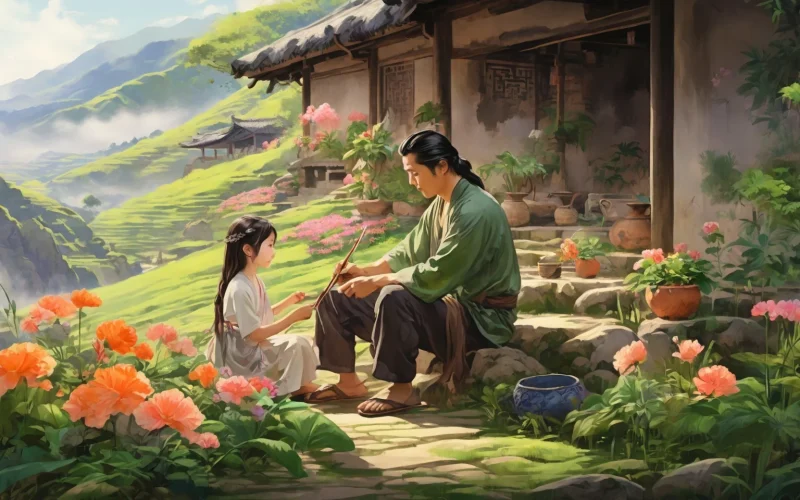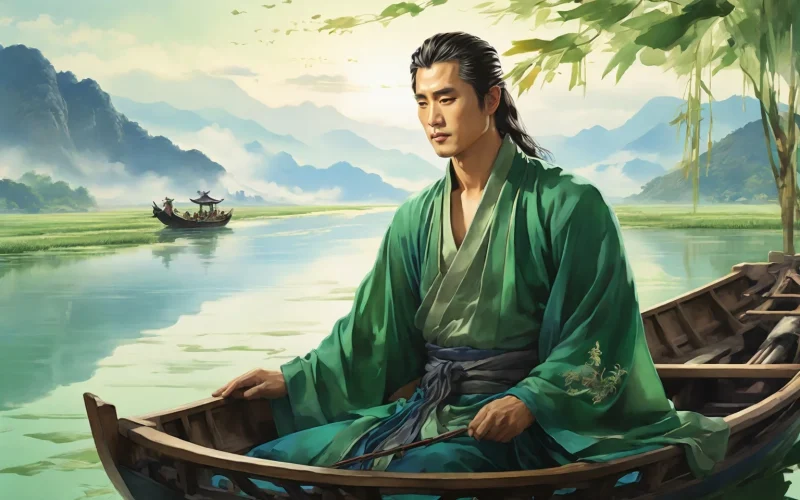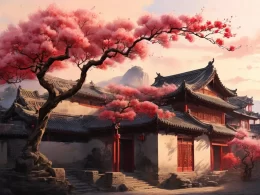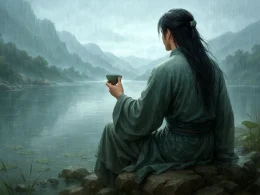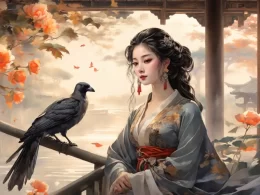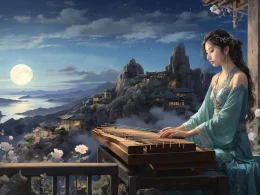Hills and lakes attract me for long.
Should I stay away from their song?
It’s for my kinsmen near and dear
That nowhere else I would appear.
Fine morning enters curious breast,
Cane in hand, I head for Cot West.
Along the way no passers-by,
But ruined huts arrest the eye.
I have repaired my thatched cot
And ploughed new furrows in my plot.
When valley wind turns chill at first,
I drink spring wine to quench my thirst.
A daughter cannot help as man,
But she will comfort as she can.
The court affairs seem far away
From us with each year and each day.
I plough and weave enough for me;
From other needs I am carefree.
A hundred years will come to end,
Then life and fame with death will blend.
Original Poem
「和刘柴桑」
陶渊明
山泽久见招,胡事乃踌躇?
直为亲旧故,未忍言索居。
良辰入奇怀,挈杖还西庐。
荒涂无归人,时时见废墟。
茅茨已就治,新畴复应畬。
谷风转凄薄,春醪解饥劬。
弱女虽非男,慰情良胜无。
栖栖世中事,岁月共相疏。
耕织称其用,过此奚所须。
去去百年外,身名同翳如。
Interpretation
This responsive poem was composed at the invitation of Liu Yimin (the recluse Liu Yi of Eastern Jin), embodying the literati tradition of poetic correspondence. Through conversational verses, Tao Yuanming acknowledges his friend's concern while describing his current reclusive life with tranquil sincerity. The work reveals his detachment from worldly affairs and meditation on life's essence, exemplifying how scholar-recluses used poetry for mutual consolation and philosophical exchange.
First Couplet: "山泽久见招,胡事乃踌躇?"
Shān zé jiǔ jiàn zhāo, hú shì nǎi chóuchú?
Long you've bid me join your mountain retreat / Why then do I hesitate, what stays my feet?
The rhetorical opening responds to Liu's persistent invitations while establishing the poem's contemplative tone. "Mountain-marsh" symbolizes eremitic life, and "hesitation" introduces the central tension between solitude and human connection.
Second Couplet: "直为亲旧故,未忍言索居。"
Zhí wèi qīn jiù gù, wèi rěn yán suǒjū.
Only for beloved kin and friends / Can I bear to postpone my reclusive ends
Here Tao confesses emotional ties prevent complete withdrawal, blending affection with ascetic inclination—a hallmark of his philosophical authenticity.
Third Couplet: "良辰入奇怀,挈杖还西庐。"
Liáng chén rù qí huái, qiè zhàng huán xī lú.
Fair seasons stir wondrous thought / Staff in hand, to western hut I'm brought
"Wondrous thought" reveals nature's power to inspire, while the staff and hut imagery concretize his rustic existence.
Fourth Couplet: "荒途无归人,时时见废墟。"
Huāng tú wú guī rén, shíshí jiàn fèixū.
Desolate paths lack homebound souls / Frequent ruins mark our tragic roles
This stark observation of societal decay shows Tao's unflinching vision despite reclusion—his compassion persisting amid abandonment.
Fifth Couplet: "茅茨已就治,新畴复应畲。"
Máo cí yǐ jiù zhì, xīn chóu fù yīng shē.
Thatched roof repaired against the rains / New fields await my farming pains
Practical details of cottage maintenance and crop rotation demonstrate Tao's commitment to self-sufficient authenticity.
Sixth Couplet: "谷风转凄薄,春醪解饥劬。"
Gǔ fēng zhuǎn qī bó, chūn láo jiě jī qú.
Mountain winds grow bleak and thin / Spring ale soothes my hunger within
The elemental contrast between harsh winds and comforting wine encapsulates his balanced acceptance of life's hardships and simple pleasures.
Seventh Couplet: "弱女虽非男,慰情良胜无。"
Ruò nǚ suī fēi nán, wèi qíng liáng shèng wú.
Though my frail girl's no son / Her comfort's better than none
This tender admission about daughterly affection reveals Confucian familial values persisting within his Daoist-leaning solitude.
Eighth Couplet: "栖栖世中事,岁月共相疏。"
Xīxī shì zhōng shì, suìyuè gòng xiāng shū.
The world's bustle fades away / As years estrange us day by day
A philosophical crystallization—time's passage naturally dilutes worldly attachments, an organic process requiring no forced rejection.
Ninth Couplet: "耕织称其用,过此奚所须?"
Gēng zhī chèn qí yòng, guò cǐ xī suǒ xū?
When farming clothes and feeds / What more could one need?
The essence of Tao's philosophy: sufficiency defined by fundamental needs rather than social ambitions.
Tenth Couplet: "去去百年外,身名同翳如。"
Qù qù bǎi nián wài, shēn míng tóng yì rú.
Beyond our century's line / Body and fame alike decline
The stark memento mori conclusion reflects Tao's radical embrace of impermanence—a challenge to contemporary fame-seeking literati.
Holistic Appreciation
This poetic epistle masterfully interweaves domestic vignettes with metaphysical musings. Tao's "thatch repair" and "new fields" ground abstract philosophy in tangible reality, while "mountain winds" and "spring ale" exemplify his signature fusion of sensory immediacy with spiritual insight. The progression from practical concerns (couplets 5-7) to existential contemplation (8-10) mirrors the poet's daily ascent from earthly labors to philosophical heights.
The poem's genius lies in making profound philosophy emerge organically from mundane details—a daughter's comfort becoming a meditation on value, farming tools transforming into symbols of existential sufficiency. This seamless blending of the quotidian and the eternal defines Tao's unique contribution to Chinese literature.
Artistic Merits
- Dialogic Authenticity: The question-answer framework creates intimate philosophical exchange
- Concrete Transcendence: Farming implements and weather conditions become metaphysical symbols
- Progressive Revelation: Practical details gradually unveil deeper existential layers
- Unadorned Profundity: Simple diction ("spring ale," "frail girl") conveys complex wisdom
Insights
Tao's verses offer an antidote to modern alienation—his conscious embrace of simplicity (farming, family, thatched roof) models how purposeful reduction can amplify life's richness. The poem's enduring relevance lies in its quiet revolution: rejecting sixth-century China's social climbing for measured self-sufficiency, much like today's counter-movements against consumerism. Ultimately, Tao reminds us that true freedom begins when we stop measuring life by external standards ("body and fame alike decline") and find sufficiency in present, tangible realities.
Poem translator
Xu Yuanchong (许渊冲)
About the poet

Tao Yuanming(陶渊明), 365 – 427 CE, was a poet, literary figure, fu writer, and essayist active during the late Eastern Jin and early Liu Song dynasties. Born in Chaisang (near present-day Jiujiang, Jiangxi Province), he pioneered a new genre of pastoral-themed literature, expressing profound philosophical insights through simple language. His poetic style became an enduring aesthetic standard in classical Chinese poetry.





